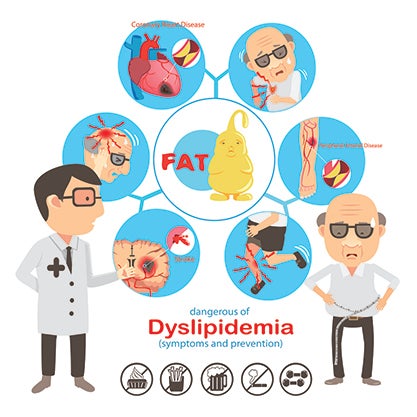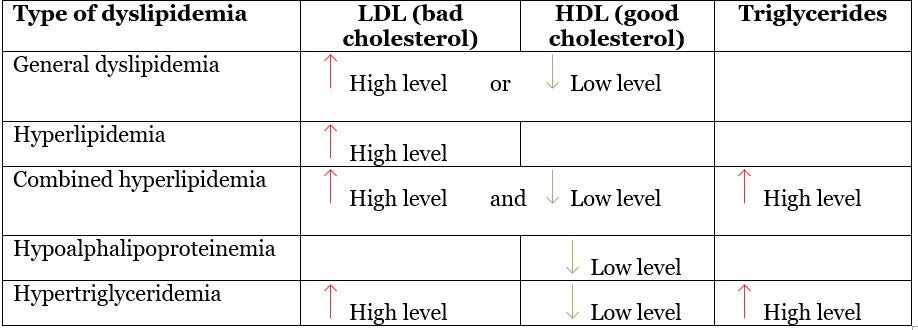What are the types of dyslipidemia?
There are two types of dyslipidemia:1
- Inherited (also called familial or primary) dyslipidemia. If someone in your family has high lipid levels or heart problems, you should consult a doctor and get all the necessary tests. The earlier you diagnose and manage this type of dyslipidemia, the better.
- Dyslipidemia that results from an unhealthy lifestyle. (This is referred to as secondary dyslipidemia; (link to article 4 for causes of dyslipidemia.) The disease is not inherited via genetic disorders but is acquired as a side effect of obesity, diabetes, smoking, or an unhealthy diet. Consult your doctor about this issue.

Primary or secondary dyslipidemia can be divided into one of four groups, as follows.
Hypercholesterolemia is characterized by very high levels of “bad cholesterol” (low-density lipoprotein, or LDL),2 above 239 mg/dL. If inherited and left untreated, people with this condition have a five-fold greater risk of developing cardiovascular disease (CVD).3
People with combined hyperlipidemia (CH) have high levels of both LDL and triglycerides.2 If inherited, CH usually manifests early (i.e., before one’s 20s) and with high cholesterol levels, which implies a high risk of cardiovascular diseases. There is a 50% chance of inheriting this disease from a parent.4
Hypoalphalipoproteinemia is associated with low levels of “good cholesterol” (high-density lipoprotein, or HDL) and can also be inherited. An HDL level lower than 35 mg/dL is considered a significant CVD risk factor; a lower HDL level makes the elimination of excess LDL and triglycerides more difficult.2
Hypertriglyceridemia (HTG) can be either inherited or acquired, and it is characterized by a high in-blood triglyceride level. People with HTG also tend to have low HDL levels and high LDL levels.5
The following table summarizes the types of dyslipidemia, based on cholesterol levels.

Consult with your doctor to learn more about dyslipidemia; he or she will help you understand more about the causes of the disease and the ways to address it.
References:
1. Medicalnewstoday.com. Dyslipidemia: Everything You Need to Know. https://www.medicalnewstoday.com/articles/321844. Published 2020. Accessed November 4, 2020.
2. Devara, S., & Jialal, I. Laboratory Investigation of Dyslipidemia. Lab Med, 1998;29(7):432–436.
3. American Heart Association. Familial Hypercholesterolemia. https://www.heart.org/en/health-topics/cholesterol/causes-of-high-cholesterol/familial-hypercholesterolemia-fh. Published 2020. Accessed October 14, 2020.
4. Brenman, L., & Kordesh, S. Familial Combined Hyperlipidemia. https://mydoctor.kaiserpermanente.org/ncal/specialty/genetics/resources/conditions/familial_combined_hyperlipidemia.jsp. Published 2020. Accessed October 14, 2020.